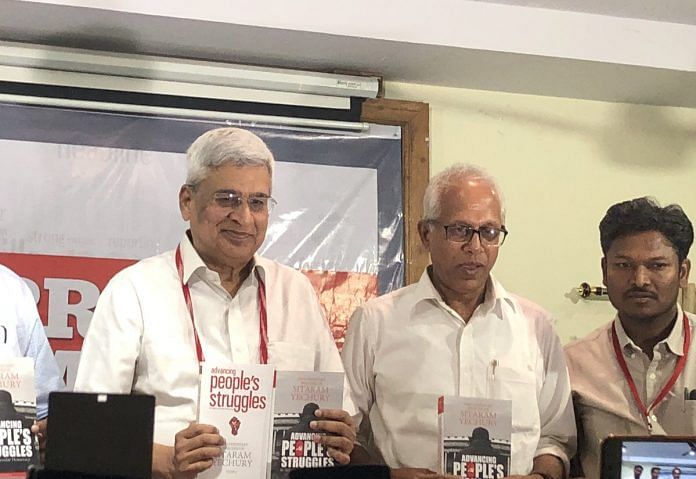The ongoing Party Congress of CPI(M) in Hyderabad will decide whether to keep doors for an understanding with the Congress open or not.
Hyderabad: At the heart of the big row in the CPI(M)’s ongoing Party Congress in Hyderabad, and what had threatened to actually split the party right down the middle, is its political resolution.
The big divide is between the factions led by party general secretary Sitaram Yechury and his predecessor Prakash Karat over what political-tactical line to adopt, with the former batting for leaving doors for an understanding with the Congress open and the latter opposing it.
So, what is the party’s political resolution, why is it important and how is it prepared?
The CPI(M)’s political resolution, besides putting down the party’s stand on various domestic socio-economic issues and foreign affairs, lays down the party’s political and tactical line — essentially the political and electoral course it would adopt for the three years until the next Party Congress.
The draft political resolution, endorsed by the Central Committee, has to be released for discussion by all units two months before the Party Congress. State committees then need to render it into respective languages and forward to all branch committees. Amendments to the resolution are sent directly to the Central Committee which places its report on them before the Party Congress.
The adoption of the political resolution happens then in the Party Congress, after amendments are moved and discussed.
The political resolution is crucial for the party since it “determines the party line in current situation”.
For instance, the political resolution adopted in November 2003 laid the foundation for the party’s alliance with the Congress in 2004. While Karat was not in favour of the resolution, it was backed by then general secretary Harkishan Singh Surjeet, and Yechury, among others.
“The CPI(M) in Andhra Pradesh will work for the defeat of the TDP-BJP alliance in the forthcoming assembly elections. For this, the Andhra Pradesh state committee will contest only in seats where we have an effective presence,” the resolution said.
“We appeal to all secular and democratic forces to support our candidates just as we will be extending support to the candidates of the Left and secular parties who can defeat the TDP-BJP in areas where we are not contesting,” it read.
Unlike the past, it did not draw a line between the Congress and other secular parties, thus ending CPI(M)’s treatment of Congress as a political untouchable and making it open to allying with it.
However, the political line in the resolution has in the past, in rare instances, been diluted to suit state-wise conditions.
In April 2015, the political resolution adopted in the Visakhapatnam read: “While the main direction of the struggle is against the BJP, the party will continue to oppose the Congress.”
“It has pursued neo-liberal policies and it is the Congress-led UPA government’s anti-people policies and massive corruption which helped the BJP to acquire popular support. The party will have no understanding or electoral alliance with the Congress,” it had said.
Despite this, however, the party, in an unprecedented move, fought the 2016 West Bengal assembly elections in alliance with the Congress, following pressure from the Bengal state unit.




1. My view is that ordinary citizens are least concerned about party’s political resolution but they are certainly interested in party’s stand on different political issues. From their point of view, particularly from point of view of those who may have some sympathy for CPI(M) as a political party, question that needs to be asked is how relevant are CPI(m)’s policies today? One cannot forget that the party has been rejected by voters in West Bengal (WB) in two consecutive elections and recently in Tripura. Has it learnt any lesson? 2. Here, let us not forget that in WB the leftists were in power for almost three decades but still their govt. was overthrown. WB remained an industrially backward state. Trinamool Congress saw an opportunity in West Bengal to expose hollowness of leftists’ ideology. In Tripura BJP’s rightist ideology succeeded in exposing leftists’ ideology. 3. Hence my question today is this: Would CPI(M) leaders do a critical self-examination now that it is losing its voters everywhere? Also, I also think that such self-examination, without reconsideration of CPM’s basic economic agenda, would be of little assistance in today’s electoral politics.